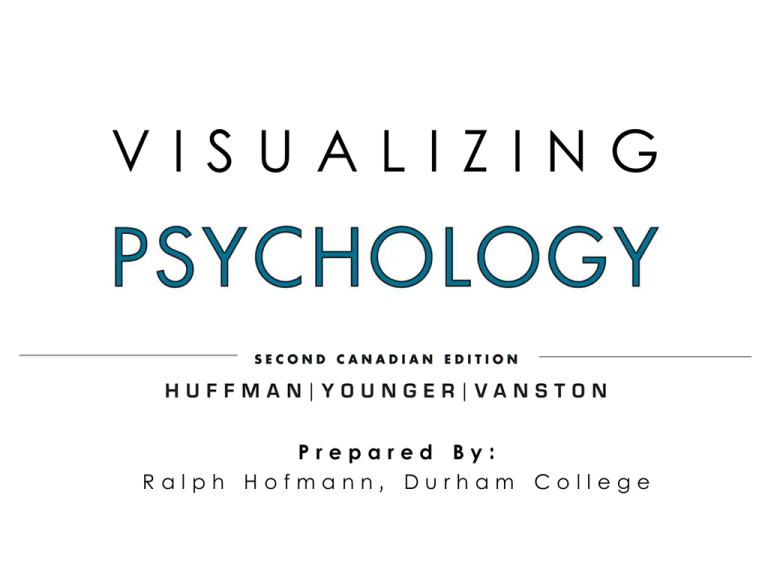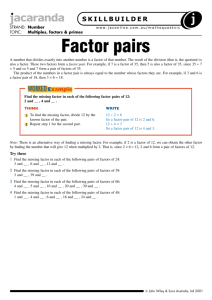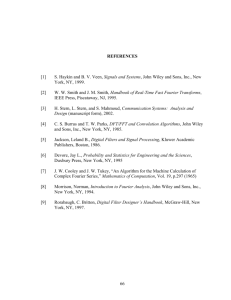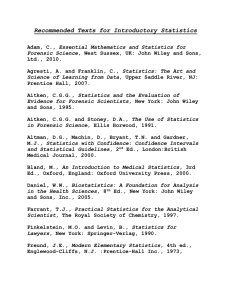
VISUALIZING
Prepared By:
Ralph Hofmann, Durham College
Chapter 3:
Stress and Health
Psychology
Media Enhanced PowerPoint Presentation
Copyright © 2013 John Wiley & Sons, Canada Ltd
2
Lecture Overview
•
•
•
•
Understanding Stress
Stress and Illness
Health Psychology
Managing Stress and Maximizing WellBeing
Copyright © 2013 John Wiley & Sons, Canada Ltd
3
U n d e r s t a n d i n g
S t r e s s
LEARNING OBJECTIVES:
1. Describe some common sources of
stress.
2. Explain how the body responds to
stress, immediately and over the
long term.
3. Review the three phases of the
general adaptation syndrome
(GAS).
Copyright © 2013 John Wiley & Sons, Canada Ltd
4
Understanding Stress
• Stress
– A nonspecific response of the body to any
demand made on it.
– The physical and mental arousal that we
perceive as threatening or challenging.
Copyright © 2013 John Wiley & Sons, Canada Ltd
5
Understanding Stress
• Stressor
– An event that places demands on an organism
that taxes its resources
• Eustress
– Pleasant, beneficial or curative stress
Copyright © 2013 John Wiley & Sons, Canada Ltd
6
Sources of Stress
• Holmes and Rahe (1967)
– Believed that any life change could cause stress
– Exposure to stressful events within a short
period could have a direct/detrimental effect
on health
– Created Social Readjustment Rating Scale
Copyright © 2013 John Wiley & Sons, Canada Ltd
7
Social Readjustment
Rating Scale
Copyright © 2013 John Wiley & Sons, Canada Ltd
8
Sources of Stress
Copyright © 2013 John Wiley & Sons, Canada Ltd
9
Work Related Stress
• Poor working conditions, psychological
demands and job insecurity are risk factors
for chronic psychological distress
• Job skill level and decision making
autonomy are not
Copyright © 2013 John Wiley & Sons, Canada Ltd
10
Sources of Stress
• Hassles
– Small, everyday problems that accumulate to
become a source of stress
• Frustration
– Unpleasant tension resulting from a blocked
goal
• Conflict
– Forced choice between two or more
incompatible alternatives
Copyright © 2013 John Wiley & Sons, Canada Ltd
11
Cataclysmic Events
• One of the most dramatic causes of severe
stress
• Occur quickly and wreak havoc on the lives
and well-being of many
Copyright © 2013 John Wiley & Sons, Canada Ltd
12
Types of Conflict
• Approach-approach
– Forced choice between two or more desirable
alternatives
• Avoidance-avoidance
– Forced choice between two or more undesirable
alternatives
• Approach-avoidance
– Forced choice between two or more alternatives
both having desirable and undesirable results
Copyright © 2013 John Wiley & Sons, Canada Ltd
13
How Stress Affects the
Body
• During stress, physiologic changes are
activated by two major pathways
• SAM system
– Sympatho-adreno-medullary
– Rapid acting stress response
• HPA axis
– Hypothalamic-pituitary-adrenalcortical
– Responds more slowly but lasts longer
Copyright © 2013 John Wiley & Sons, Canada Ltd
14
Effects of Stress
Copyright © 2013 John Wiley & Sons, Canada Ltd
15
Effects of Stress
Copyright © 2013 John Wiley & Sons, Canada Ltd
16
Long Term Effects of
Stress
• Cortisol is a key element of the HPA axis
• Prolonged elevation of cortisol is related to:
– increased depression, memory problems, etc.
– impairment of the immune system, which
leaves the body vulnerable to disease.
Copyright © 2013 John Wiley & Sons, Canada Ltd
17
Psychoneuroimmunology
• Interdisciplinary field that studies the effect
of psychological factors on the immune
system
Copyright © 2013 John Wiley & Sons, Canada Ltd
18
General Adaptation
Syndrome
• First coined by Hans Selye
• Three part generalized model of how
organisms react physiologically to stressors
– Alarm reaction (SAM system)
– Stage of resistance (HPA axis)
– Stage of exhaustion (HPA axis)
Copyright © 2013 John Wiley & Sons, Canada Ltd
19
General Adaptation
Syndrome
Copyright © 2013 John Wiley & Sons, Canada Ltd
20
S t r e s s a n d
I l l n e s s
LEARNING OBJECTIVES
1.
2.
3.
4.
Explain why an immune system compromised
by stress might be more vulnerable to cancer
growth.
Describe the personality trait that can
influence how we respond to stress.
Describe the key symptoms of post-traumatic
stress disorder (PTSD).
Explain how biological and psychological
factors can jointly influence the development
of gastric ulcers.
Copyright © 2013 John Wiley & Sons, Canada Ltd
21
Leading Causes of
Death
Copyright © 2013 John Wiley & Sons, Canada Ltd
22
Cancer
• Cancer occurs when a particular type of cell
begins to rapidly divide unchecked
• Then forms a mass or a tumour that
invades surrounding healthy tissue
• Over 100 types of cancer have been
identified
• Appear to be the caused by an interaction
of environmental and genetic factors
Copyright © 2013 John Wiley & Sons, Canada Ltd
23
Can Stress Cause
Cancer?
• A healthy immune system checks the
uncontrolled growth of cells
– Attacks and kills abnormal cells
– Ongoing stress caused adrenal glands to
release hormones that suppress immune
function
– Less able to contain the growth of
aberrant cells
Copyright © 2013 John Wiley & Sons, Canada Ltd
24
Stress and
Cardiovascular Disease
• Cardiovascular disease
– Includes heart disease and stroke
– Kills tens of thousands of Canadians each year
• Ongoing stress is a major contributor
– Autonomic nervous system releases
epinephrine and cortisol
– Increase heart rate and release fat and glucose
– If no fight or flight occurs, fat is allowed to
adhere to blood vessels
Copyright © 2013 John Wiley & Sons, Canada Ltd
25
Hardiness
• Resilient personality style that comes from
three distinct attitudes
– Strong sense of commitment to work and
personal life
– See themselves as being in control of their lives
as opposed to victims
– Look at change as a challenge and not as a
threat
Copyright © 2013 John Wiley & Sons, Canada Ltd
26
Hostility
• Personality trait that is the strongest predictor
of developing heart disease
• Stress associated with cynical hostility
Copyright © 2013 John Wiley & Sons, Canada Ltd
27
Post-Traumatic Stress
Disorder
• Anxiety disorder that develops following
exposure to a life-threatening or other
extreme event
• Characterized by flashbacks, nightmares
and impaired daily functioning
• Essential feature is severe anxiety
Copyright © 2013 John Wiley & Sons, Canada Ltd
28
Post-Traumatic Stress
Disorder
Copyright © 2013 John Wiley & Sons, Canada Ltd
29
Coping with Extreme
Trauma
Copyright © 2013 John Wiley & Sons, Canada Ltd
30
Stress and Gastric
Ulcers
• Painful lesions to the stomach and upper part
of the small intestine
• H. Pylori bacteria also associated with ulcers
– 75% of normal stomachs also have the bacterium
– Ulcers cannot be purely because of H Pylori
– Psychological factors (stress) must also contribute
• Amygdala activity also appears to play a role
– Increased stress hormone and HCl production
Copyright © 2013 John Wiley & Sons, Canada Ltd
31
H e a l t h
P s y c h o l o g y
LEARNING OBJECTIVES:
1. Explain what health psychologists do.
2. Review the challenges in preventing
teenagers from smoking.
3. Describe what the term binge
drinking means.
4. Describe the risks associated with a
sedentary lifestyle.
Copyright © 2013 John Wiley & Sons, Canada Ltd
32
Health Psychology
• The study of how
biological, psychological,
and social factors affect
health and illness
• Biopsychosocial
model
Copyright © 2013 John Wiley & Sons,
Canada Ltd
33
Health Psychology
• Interested in the influences on physical
health and well-being
– Lifestyle and activities
– Emotional reactions
– Ways of interpreting events
– Personality characteristics
• Particularly interested in the relationship
between stress and the immune system
Copyright © 2013 John Wiley & Sons, Canada Ltd
34
Tobacco
• Short and long term health risks
– Most people are aware of the risks
– The more they smoke, the more at risk
– The first puff is rarely pleasant
Copyright © 2013 John Wiley & Sons, Canada Ltd
35
Why Do People Start
Smoking?
• Smoking starts when people are young
– Peer pressure, imitation of celebrity role
models
• Nicotine is addictive
– Similar to cocaine and alcohol addiction
• Smokers learn to associate smoking with
pleasant activities
– Good food, relaxation, social activities, sex
– Nicotine high
Copyright © 2013 John Wiley & Sons, Canada Ltd
36
Smoking Rates
Copyright © 2013 John Wiley & Sons, Canada Ltd
37
Smoking Cessation
• Success rates for going “cold turkey”
extremely low
• Some programs combine nicotine
replacement with cognitive and behavioural
therapy
• Prescription medications
– Buproprion (Zyban or Wellbutrin)
– Champix
Copyright © 2013 John Wiley & Sons, Canada Ltd
38
Advertised but
Unproven Methods
•
•
•
•
•
Acupuncture
Acupressure
Electrostimulation
Laser therapy
Hypnosis
Copyright © 2013 John Wiley & Sons, Canada Ltd
39
Alcohol
• Creates harm when consumed in large
quantities
– All at once or over time
– Excessive consumption causes serious brain
damage
Copyright © 2013 John Wiley & Sons, Canada Ltd
40
Binge Drinking
• A man consumes five or more drinks in a
row or a women consumes four or more
drinks in a row
• At least three occasions during the previous
two weeks
Copyright © 2013 John Wiley & Sons, Canada Ltd
41
Binge Drinking
• Alcohol depresses neural activity
– In extreme cases, the respiratory centre stop
working and death ensues
• Explains why binge drinking is so dangerous
• Significant problem on College and
University campuses
Copyright © 2013 John Wiley & Sons, Canada Ltd
42
Seven Signs of Alcohol
Dependence
• Significant drinking occurs regularly,
sometimes to the point of almost daily
consumption
• Drinking is given a higher priority than
other activities
• More and more alcohol is required to
obtain the same effect (tolerance)
• Even short periods of abstinence causes
withdrawal syndrom
Copyright © 2013 John Wiley & Sons, Canada Ltd
43
Seven Signs of Alcohol
Dependence
• Withdrawal symptoms are relived by
further drinking, especially in the morning
• Individual is aware of the subjective craving
for alcohol and has little control over the
quantity and frequency of intake
• If the person returns to drinking after a
period of abstinence, the previous high
consumption will be re-established
Copyright © 2013 John Wiley & Sons, Canada Ltd
44
Risks of a Sedentary
Lifestyle
• Increased risk of developing a number of
diseases and disorders
– Obesity
– Type II diabetes
– Some cancers
– Heart disease
– Premature death
Copyright © 2013 John Wiley & Sons, Canada Ltd
45
Student Strategies
•
•
•
•
Park farther away from building entrances
Use stairs instead of the elevator
Avoid using automatic door openers
Get up and walk around during breaks in
class
• Walk whenever possible between classes
• Use a pedometer
• Visit the school gym, take classes
Copyright © 2013 John Wiley & Sons, Canada Ltd
46
M a n a g i n g
S t r e s s
a n d
M a x i m i z i n g
W e l l - B e i n g
LEARNING OBJECTIVES:
1. Compare emotion-focused and
problem-focussed forms of coping.
2. Explain the role that interpretation
plays in shaping our responses to
stressors.
3. Review some major resources for
combating stress.
Copyright © 2013 John Wiley & Sons, Canada Ltd
47
Coping with Stress
• Coping
– Adaptive or compensatory strategies designed
to reduce the effects of a stressor
• Not an act but a process
• Not all strategies are effective or guarantee
a successful outcome
• Emotion response depends on how we
interpret it
Copyright © 2013 John Wiley & Sons, Canada Ltd
48
Cognitive Appraisal
and Coping
Copyright © 2013 John Wiley & Sons, Canada Ltd
49
Emotion-Focused
Coping
• Emotional or cognitive strategies that
change how we feel about a stressful
situation
• If the reappraisal is accurate and does not
distort the facts, it may alleviate stress
• e.g. you may reappraise the job that you
did not get as not the right match
Copyright © 2013 John Wiley & Sons, Canada Ltd
50
Problem-Focused
Coping
• Deal directly with the stressor by coming
up with practical solutions that eventually
decrease or eliminate it
– Identify the stressful problem
– Generate possible solutions
– Select the appropriate solution
– Apply the solution to the problem
Copyright © 2013 John Wiley & Sons, Canada Ltd
51
Resources for Healthy
Living
•
•
•
•
•
•
•
•
Health and exercise
Positive beliefs
Social skills
Social support
Control
Material resources
Relaxation
Sense of humour
Copyright © 2013 John Wiley & Sons, Canada Ltd
52
Health Canada
Recommendations
•
•
•
•
•
Eat nutritiously
Build a circle of social contacts
Stay physically active
Choose not to smoke
Put an end to negative lifestyle practices
Copyright © 2013 John Wiley & Sons, Canada Ltd
53
Multimedia
Web Links
Physical Effects of Stress
A number of physical effects of stress can help us to
identify and timely address the problem. Making a
correct diagnosis is key to overcome stress.
Study probes the link between cancer and stress
Can stress cause cancer, or even hasten a patient's
death? It's a daunting, emotionally charged question
with no simple answers, but it represents a growing
field of research that scientists hope could eventually
lead to breakthroughs in cancer treatment.
Reduce your stress
Although stress can sometimes be a good thing, too
much stress can actually harm your health and
increase your risk of heart disease and stroke. Here
are some effective stress-busting tips.
The traumatic effects of extreme stress
Post-traumatic stress disorder affects growing
numbers of Canadians, especially soldiers
Stress disorder on rise in RCMP
The number of Mounties on disability for posttraumatic stress disorder has climbed significantly in
the past decade, according to RCMP statistics
obtained by CBC News.
Coping with PTSD and Recommended Lifestyle
Changes for PTSD Patients
Because PTSD symptoms seldom disappear
completely, coping with PTSD symptoms and the
problems they cause is usually a continuing challenge
for survivors of trauma. Often, it is through receiving
treatment for PTSD that many learn to cope more
effectively.
Smoking & Tobacco
Facts about smoking
Teen smokers more likely to abuse alcohol, other
drugs
Teens who smoke cigarettes are more likely to drink
and abuse alcohol compared to their non-smoking
peers, according to a report released on Wednesday.
Copyright © 2013 John Wiley & Sons, Canada Ltd
54
Multimedia
Web Links
Student binge drinking: a problem well past the
tipping point
Universities confronting the problem of student
drinking
Teenage Binge Drinking
There is little decline in teenage binge drinking,
although statistics show that drinking by teens in
general is on the decline.
Sitting and screen time: How they affect your health
Chances are, you're reading this on some type of
screen, whether it's a computer monitor, cellphone,
smartphone or other device. Researchers are
increasingly finding that all that time spent sitting,
working and playing online can take its toll on our
bodies, both physically and mentally.
Stress Relaxation Techniques
Letting Go of Tension
Power of Positive Thinking
What do motivational speakers, life coaching and
personal growth experts around the world, always
try to impress upon us? Many things, of course, but
to sum it up in one phrase - it's the power of thinking
positively.
One Healthy Lifestyle
Homepage
Copyright © 2013 John Wiley & Sons, Canada Ltd
55
Multimedia
Videos
Stress Changes Your Brain (1:23)
We all know that stress is bad for us. But as this
ScienCentral News video reports, neuroscientists
now say chronic stress can actually change parts of
our brains.
Mending Broken Hearts (2:14)
How do you mend a broken heart? Medical experts
now say it can be done
Post Traumatic Drugs – (Post-Stress Drugs) (1:10)
Some of the soldiers who fought in Iraq will return
home with a wound that cannot be seen: PostTraumatic Stress Disorder. But as this ScienCentral
News video reports, scientists may have found a
potential treatment for the condition.
Smoking, Stress and Gender (1:38)
People trying to quit smoking often fail because of
stress. As this ScienCentral News video reports, now
physiologists have found that the reason for this is
different in men and women.
Alcohol and Ads (1:47)
The National Academies’ National Research Council
released a much-anticipated report on Tuesday,
September 9, 2003, on combating underage drinking.
One recommendation, reducing young peoples'
exposure to alcohol advertising. As this ScienCentral
News video reports, neuroscientists have studied
alcohol ads' appeal to underage drinkers.
Stronger Brains (1:36)
Are you having trouble keeping that New Year's
resolution to get more exercise? As this ScienCentral
News video reports, scientists are finding more
reasons you should stick to it.
Older Women and Exercise (1:23)
We know that exercise can help us feel young and
stay healthy. But neuroscientists say it can help us
stay mentally young as well.
Copyright © 2013 John Wiley & Sons, Canada Ltd
56
Multimedia
Animations
Managing Stress Improves Health
Here is George W. Bush at the beginning of his
presidency.
Copyright © 2013 John Wiley & Sons, Canada Ltd
57
Copyright
Copyright © 2013 John Wiley & Sons Canada, Ltd.
All rights reserved. Reproduction or translation of this
work beyond that permitted by Access Copyright (The
Canadian Copyright Licensing Agency) is unlawful.
Requests for further information should be addressed
to the Permissions Department, John Wiley & Sons
Canada, Ltd. The purchaser may make back-up
copies for his or her own use only and not for
distribution or resale. The author and the publisher
assume no responsibility for errors, omissions, or
damages caused by the use of these programs or
from the use of the information contained herein.
Copyright © 2013 John Wiley & Sons, Canada Ltd
58




